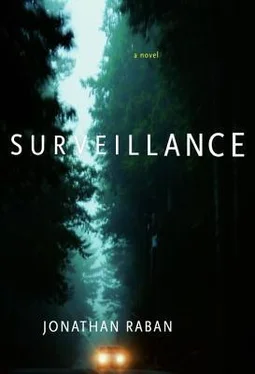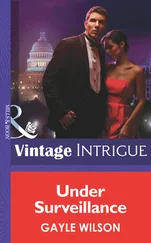“Homeless people,” Tad said.
The alley had always been off-limits to Alida, and the line of overflowing Dumpsters, the open-air club of unshaven men with bedrolls and dogs on string leashes, held for her the romantic fascination of forbidden territory. When she walked past, sometimes men would call out to her — not in a scary way, just sort of saying hi. Schooled by her mother, she’d quicken her step and focus frigidly on the middle distance, making like an automaton. This was what her mom called street smarts: shoulders back, look straight ahead, and walk with purpose, always stay on the outside of the sidewalk, never make eye contact with strangers. Alida usually failed to observe these rules for more than about thirty seconds because street smarts made you look so weird that people would stare like you were some kind of retard.
“ Scumbags, ” the landlord said, turning around to answer Tad. “Lowlifes. They got weapons out there. I could show you. All kind of weapons.”
That was another thing. Twice in the last year, Alida had heard the crack of what sounded like gunshots. “Just a car backfiring,” her mom said, but so quickly that Alida knew she was lying. One morning, the alley had been cordoned off with yellow tape, and police cars with flashing lights were blocking both ends. Though nobody said anything, Alida guessed there’d been a murder. From her bedroom window, she scrutinized the paving stone for bloodstains, but they’d obviously hosed the alley clean. She hugged this knowledge to herself: what parents would let their kids come over to a house on such intimate terms with murder? Yet she was proud of her scary secret. “Yeah, we had a homicide,” she’d think, and the thought felt satisfyingly grown-up and sophisticated; it put her in a place where stuff happened that ordinary people only read about in books or saw on TV — though she never told anybody, not even Tad, because she wasn’t one hundred percent sure that it was true.
“You got a nice life here,” the landlord said, and the sweep of his hand took in the patterned rugs, the stereo, the desktop computer, the pine furniture, everything stripped and varnished by her mom, the big old leather couch on which they’d snuggle up to watch movies on DVD.
For a split second, Alida saw it all as the landlord must see it — its warmth and coziness, its tan and scarlet colors, not just anybody’s home, but one that was unique to her and her mom.
“Penthouse apartment. City view, water view. Whole lot of people want what you got here, and you know what? Them scumbags down there hate you for it. They kill for what you got. How often you get break-ins, huh?”
“Never,” Tad said with a fierceness that took Alida by surprise.
“Touch wood.” Her mom, laughing too loud, made a big show of slapping her palm on the tabletop.
From her window, Alida had often seen Tad talking to the men who slept in the alley. Sometimes he went with food, sometimes with money. So was he like buying protection from them?
“Hey, you guys, I’ll show you something. Missy there — you lock me out, okay?”
Alida resented being called Missy but did as she was told, shutting the door on him and hearing the decisive double clunk of the lock spring shut. The moment she was back in her seat, though, the door opened on Mr. Lee, smiling modestly, hands behind his back, tipping his head in a little ceremonial bow to the people at the table.
“No key!” He showed the empty palm of his left hand, then held up a card in his right. “Driver’s license.” He wriggled it through the air — a quick, falling shimmer of green. “See?”
“Nice trick,” Tad said. “I wish I could do that. But I guess they didn’t offer Robbery 101 when I was in college.” He was using his “gay” voice — nasal, a pitch higher than normal, ending each sentence like it was a question. It was the voice he put on to talk to people he didn’t like. Alida saw her mom cast him a warning glance, like he’d better watch it, or else.
The grinning landlord, deaf to Tad’s hostility, said, “That’s how much security you got. Make you feel real safe, huh? First thing I’m gonna get you locks that lock, not like that chickenshit you got there.”
Chickenshit? In Alida’s mind, the word “landlord” conjured someone who’d never, ever say “chickenshit,” and the more she saw of Mr. Lee, the more he seemed like an imposter. The old landlord — the real landlord — had been an incredibly ancient, fragile bag of bones in a black topcoat and checkered scarf, his mottled scalp shining under a thin fluff of silvery hair, with the voice of a wheezing bird. Every year, just before Christmas, Mr. Winslow would look in for a ten-minute chat, always bringing a wrapped box of candy for Alida. He talked in a roundabout, flowery way, like a character in one of those boring PBS series that her mom liked to watch, where everybody wore costumes and the women had huge fake butts tucked into the backs of their skirts, which was gross. They spent most of their time wandering around gardens speaking in Olde English and never getting anywhere, so far as Alida could make out. Yet she liked Mr. Winslow, even if — or maybe because — he did belong in a wax museum.
Last Christmas he failed to show up, and a few days later they heard that he was dead. Then his kids — a man and a woman who looked almost as old as he did — put the Acropolis building up for sale. The first time Alida had met Mr. Lee, he was standing below her in the stairwell. He looked up, said, “Bang! Bang!” and for one appalled moment she’d thought he was holding a real gun. It turned out to be a laser gun for measuring distances, and the new landlord let her play with it for a minute or two: you pointed it at a wall, clicked the trigger, and the LCD readout showed “008' 5.75''” or whatever, which was kind of cool. But for that one moment on the stairs, Mr. Lee had looked like her every crazy fear come true.
Now her mom was asking him if he’d like a drink. Mr. Lee shook his head at the bottle of wine but said, “I’ll take water,” and sat in the empty chair beside Alida. She saw him inspecting each bowl of food on the table like he was giving it a grade — a C for this, a D for that, to judge by his pursed lips and severe eyes.
“Can I get you a plate?” her mom said from the sink, where she was filling his glass. “There’s plenty for four.”
“I ate already.”
He was too young to be a landlord — years and years younger than her mom. His Beatle haircut made him look sort of like George Harrison, if you could imagine a Korean or a Vietnamese George Harrison. He had a pierced ear but no ring in it. His gray suit, riddled through with glittering threads like silver wire, would’ve fit a much fatter man; its double-breasted jacket, open at the front, sagged over his narrow shoulders and hung in loose folds by his sides. He reeked of perfume, a sharp, waxy, leathery scent that reminded her of Tad’s mother’s car, and she bet that the label on the bottle said something like Mercedes-Benz.
“Use a fork, huh?” he said suddenly, confidentially, into Alida’s ear. “No chopsticks?” He picked up the pair beside her plate, and in his hand they turned into the clacking beak of a fierce bird. She’d never seen chopsticks move so fast and nimbly. They hovered, ospreylike, a foot above her plate, then plunged to snatch a scallop. She thought the landlord was going to put it in his mouth — gross! — but the poor scallop stayed aloft, a single drop of garlic sauce landing on her Buddhist vegetables.
“You want I teach you?”
“It’s okay,” Alida said.
He let the scallop fall back on the plate and returned the chopsticks to her place mat. “K’why-dzer!” he said.
Читать дальше












